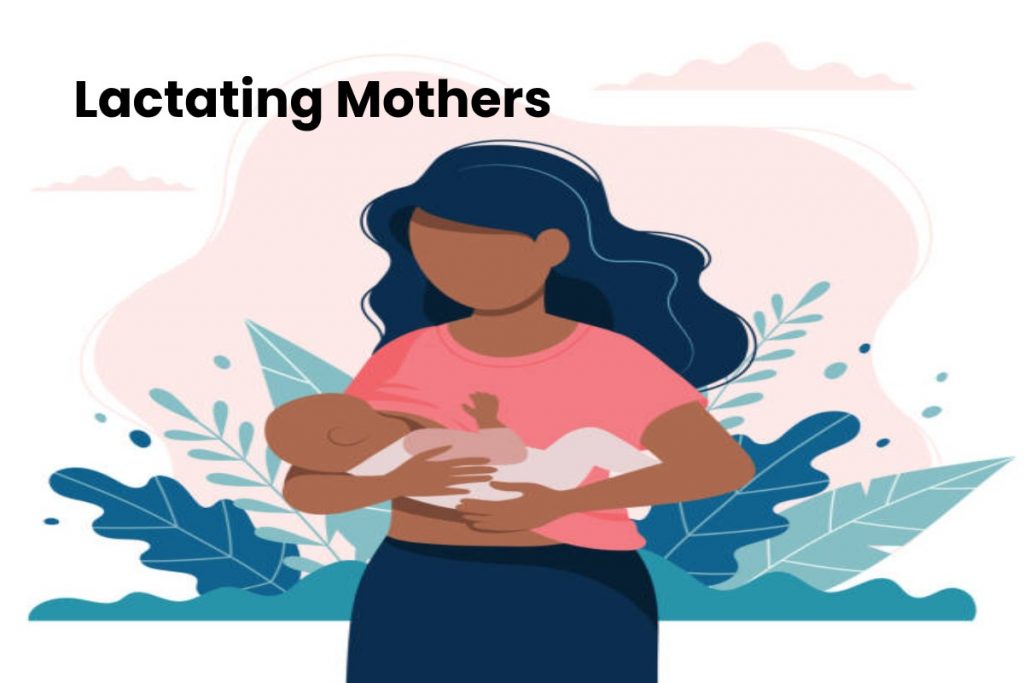Table of Contents
Definition
Lactating mothers, also known as breastfeeding mothers, is one of the crucial stages of your life for you and your satisfaction. It is vital to take care of the appropriate and healthy nutrition for you.
It would help if you realized at the beginning that your body is a milk factory and not a store for it, and in the process of making it consumes many calories. Your body loses many minerals and nutrients that you have to compensate for, so take care of healthy daily meals at appropriate and balanced calories and consider your everyday needs.
Highlights on Optimal Nutrition for Lactating Mothers
Ingredients for a healthy breastfeeding diet include:
Eat various carbohydrates and carbohydrates, focusing on complex ones and high dietary fiber such as brown bread, bulgur, and oats.
Have low-fat protein sources such as chicken and legumes such as beans and lentils.
Eat at least two servings of skimmed milk and dairy products a day, a rich source of calcium and protein.
Focus on different liquids, hot drinks, natural juices, soups, and of course, water.
Advice to Ensure Optimal Nutrition for Lactating Mothers
Take care of repeating meals during the day up to approximately five to six meals each day, including three main meals and two snacks, a glass of milk or natural juice, cheese sandwiches, or chickpeas rich in leafy vegetables, fruits such as grapes, watermelon slices.
Be sure to take your daily servings of water and not neglect it to increase milk generation and compensate for the fluids your body loses, and your daily water need is approximately 2.5 liters.
Know that breast milk derives its taste from the taste of the food and beverages, so we recommend that you stay away from spicy foods and caffeine drinks such as coffee, soft drinks, and even chocolate during lactation.
Having a cup to two cups a day of caffeine-rich drinks will not cause harm, and it is ok to eat it. Still, a lot of caffeine can have significant damage to you and your child in particular, such as intestinal lacerations, diarrhea, accumulation of gases, stress, etc.
Be sure to avoid foods that cause colic, gases, and abdominal puffs. Such as flowers, cabbages, and high-fat foods such as articles, as they will also cause your baby.
Take supplements containing ten micrograms of vitamin d every day and rely as much on food as possible to supplement the rest of the elements.
Know that breastfeeding helps to lose calories and burns and consumes excess body fat. On average, it burns 200-500 calories a day.
Wait until your baby is two months old before following any weight loss diet. Even under the supervision of a dietitian, to ensure that no deficiency or illness may affect your milk.
Vegetarian Diet and Breastfeeding
Choose foods rich in iron, protein, and calcium.
There are good sources of lentil iron, rich food breakfast cereals, green leafy vegetables, peas, and dried fruits such as raisins.
To help your body absorb iron, eat iron-rich foods with vitamin C-rich foods such as acid fruit.
Be sure to eat plant sources for protein, such as soy products, meat substitutes, legumes, nuts, seeds, and whole grains. Other options you can use include eggs and dairy products.
Calcium-rich elements include milk derivatives and dark green vegetables. Other options include rich and calcium-boosted products such as juices, breakfast cereals, soy milk, and tofu.
Be sure to take supplements. Your healthcare provider is likely to recommend taking vitamin B-12 supplements daily. Vitamin B-2 is usually found exclusively in animal products, so it isn’t easy to get it sufficiently in plant diets. If you don’t eat fish, talk to your healthcare provider about taking the Omega-3 supplement.
Conclusion
Your diet contains certain foods or drinks that may make your child agitated or have an allergic reaction. Consult your baby’s doctor if your baby is irritated, has a rash, diarrhea, or congestion immediately after lactation.
In conclusion, remember that breastfeeding should be your priority, as breastfeeding is undoubtedly the perfect food for your child
Strengthening its immunity and providing many other essential health benefits to you and you. The optimal duration of breastfeeding is at least three months, in which the child relies entirely on their mother’s milk.
Remember that there is no need to diet, especially during breastfeeding. Just focus on healthy choices, and you and your baby will benefit from that.


